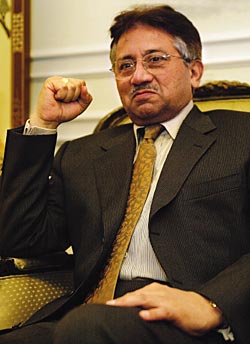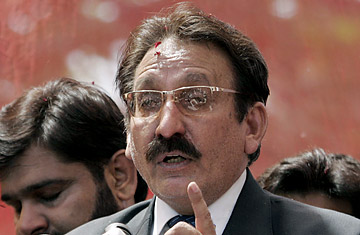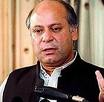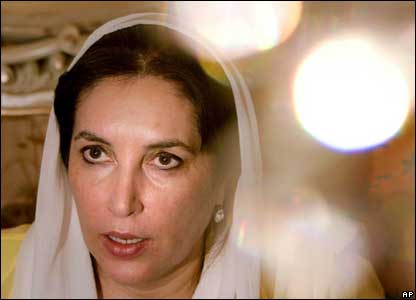Listening
exercise
BBC: Musharraf imposes emergency rule
Pakistani President General Pervez Musharraf
declares emergency rule
and suspends the constitution
reported by Barbara Plett
Source page:
http://news.bbc.co.uk/2/hi/south_asia/7076670.stm
Watch
this video – direct video link:
http://news.bbc.co.uk/media/avdb/news/world/video/130000/bb/130568_16x9_bb.ram?ad=1&ct=50
Audio
capture (local audio file)
| We
will spend two weeks on
this listening assignment, because there is so much background information
to cover before you can understand the BBC video on which the questions
are based. For this week,
carefully read the English summary below,
to learn something about the background of the current situation in Pakistan.
Also read some recent news reports, in Chinese and/or English; some links
are given below. Next week you
will be responsible for answers to the questions below, though you can
start on this part early if you have enough background to do the assignment.
You will need to look for answers to some of the questions in the written
text on BBC source page, or elsewhere on the Internet. This is a developing story, so another part of your assignment is to update yourself on the situation in Pakistan every day. New information will be added to this page as news comes in from the media, so please print this out on Tuesday evening, if possible, and bring it to class so we can read and discuss it together. |
 (image source) |
|
Here is some background information on the current situation in Pakistan
collected from many online sources to help you better understand this
assignment; read it CAREFULLY,
and check all the words you don't know. We will discuss this summary
in class on Thursday November 14. We will mark the answers to the listening
comprehension questions on November 21: Pakistani President Pervez Musharraf, for the second time during his eight years in power, declared emergency rule in Pakistan, on November 3, 2007, suspending the constitution and limiting criticism of the government by the media. Musharraf was reelected president by the Pakistani legislature on October 6, 2007, though the opposition boycotted the election, other candidates withdrew from the election, and 80 opposition party members had resigned from Parliament, protesting that Musharraf was running for re-election while remaining head of the army. Opposition groups say about 3,500 people have been arrested since emergency rule was declared. Most detainees are lawyers, although opposition party supporters and rights activists have also been arrested. There does not appear to be a groundswell of popular resistance in the nation of 160 million, which has been under military rule for much of its 60-year history. Cynicism and apathy over the political system is widespread. Demonstrations so far have been limited largely to opposition activists, rights workers and lawyers, angered by the attacks on the judiciary. |
| In March this year, Musharraf tried to fire Supreme Court Chief Justice Iftikhar Muhammad Chaudhry on misconduct charges, but he was later reinstated. On Nov. 4, authorities blacked out independent TV outlets and arrested political activists and lawyers. Musharraf also replaced Chaudhry as chief judge of the Supreme Court and placed him under house arrest, and also confined judges to the court, saying the country must fight rising Islamic extremism. This came just as the Supreme Court was to rule on whether to validate Musharraf's recent election to the presidency by a largely Musharraf-friendly Parliament. Chaudhry told lawyers by mobile phone: "Don't be afraid. God will help us and the day will come when you'll see the constitution supreme and no dictatorship for a long time." |  (image source) |
 (image source) |
Two former prime ministers of Pakistan also play a role in current events. Former Pakistani prime minister and opposition party leader Nawaz Sharif (served 1990-1993 and 1997-1999; Musharraf deposed Sharif in a coup in 1999) had been convicted of tax evasion and treason, but Sharif was released in 2000 in exchange for agreeing to 10 years of exile and not traveling to Pakistan or directly taking part in Pakistani politics. That agreement changed last week, when Pakistan's Supreme Court lifted the exile order, a decision in which Chaudhry played a leading role. Sharif attempted to return to Pakistan on Nov. 5 after seven years in exile but police ordered him to board a flight for Saudi Arabia soon after his arrival in Islamabad from London. Sharif has hinted that he may try to regain his position as prime minister. |
|
Benazir Bhutto was prime minister in 1988, then from 1993-1996, and
was removed from office both times on corruption charges. She returned
to Pakistan on October 18, 2007, after reaching an "understanding"
with General Musharraf in which an amnesty was granted to her and all
corruption charges withdrawn. Her homecoming turned into a bloodbath
when a suicide bomber struck the vehicle in which she was travelling,
killing at least 126 people and wounding another 248. Ms Bhutto escaped
unhurt and was evacuated to her residence in the city. Though
Bhutto condemned Musharraf's declaration of emergency rule on November
3, Bhutto was criticized by Sharif for negotiating with Musharraf on
a possible power-sharing deal. One condition of this deal was that Musharraf
agreed to resign as Pakistan's army chief, though he has yet to set
a timetable. Musharraf says parliamentary elections will be held before
February 15, 2008. |
 Image
source)
Image
source) |
|
New developments (1): Benazir Bhutto was placed under
house arrest Friday [11/9], an official of her party confirmed. The
area around her residence in Islamabad was sealed off by the police.
Musharraf said this was to "protect" Bhutto, in light of the
terror attack on her the day of her return to Pakistan. (New York Times,
11/09/07) (2) Pakistan's President Pervez Musharraf asks the election commission for polls to be held by 9 January, keeping to original timetable. (BBC, 11/8/07) (3) Pakistan opposition leader Benazir Bhutto is served with a seven-day detention order as the Commonwealth threatens to suspend Pakistan. Commonwealth foreign ministers have given Pakistan 10 days to lift its emergency rule or face suspension. After an extraordinary session in London, they also said President Pervez Musharraf had to step down as army chief and release political detainees. Pakistan was suspended from the Commonwealth in 1999, after Gen Musharraf seized power in a coup. It was reinstated in 2004. (BBC, 11/13/07) (4) WASHINGTON, Nov. 14 ¡X Almost two weeks into Pakistan¡¦s political crisis, Bush administration officials are losing faith that the Pakistani president, Gen. Pervez Musharraf, can survive in office and have begun discussing what might come next, according to senior administration officials. (NYT, 11/15/07) (5) Musharraf to 'quit army soon': Pakistan's attorney general says he expects President Musharraf to resign as army head before 1 December. Benazir Bhutto has been released from house arrest. Musharraf has appointed a caretaker prime minister prior to the upcoming presidential election. Video (BBC, 11/16/07) (6) Pakistan has been suspended from the Commonwealth "pending the restoration of democracy and rule of law", officials announce. (BBC, 11/22/07) (7) Pakistan's former Prime Minister Nawaz Sharif has arrived in Lahore, eight years after being toppled in a coup by Gen Pervez Musharraf. (BBC, 11/25/07) (8) Pakistani President Pervez Musharraf will quit as head of the army in time to be sworn in as civilian leader on Thursday, a spokesman says. (BBC, 11/26/07) (9) Pakistani President Pervez Musharraf is sworn in for the first time as a civilian leader, eight years after taking power in a military coup. (BBC, 11/29/07) (10) Pakistani President Pervez Musharraf says he will lift the country's month-long state of emergency on 16 December. (BBC, 11/29/07) In the meantime, Muslim extremists are challenging Musharraf's government by expanding their control of northern Pakistan, in the North West Frontier Province (NWFP) and in the neighboring province of Baluchistan, areas where terrorists allied with Osama bin Laden find refuge. The Muttahida Majlis-e-Amal (MMA), an alliance of Islamic fundamentalist parties now controlling NWFP, was able to increase its vote substantially in the elections by exploiting the growing anti-US sentiment over the US-led invasion of Afghanistan and its impact on Pakistan. At Washington¡¦s insistence, Musharraf has cracked down on Islamic extremist groups, permitted the US military to use Pakistani bases, and allowed the CIA, FBI and US Special Forces to hunt down suspected Al Qaeda and Taliban members inside the country, provoking widespread anger. About 180 people, mostly militants, have been killed in violence including bombings, abductions and shootouts, the government said. In an audacious display of force, Taliban fighters on Thursday ambushed a convoy of military vehicles in a remote tribal area on Aug. 31 and took more than 100 Pakistani troops hostage, local officials said. The army has struck another deal with militants in Waziristan under which 25 hardcore militants have been released in exchange for 200 of the soldiers taken hostage. Muslim extremism is the main reason Musharraf gives for his declaration of emergency rule. Pakistan has received an estimated 10 billion dollars of US aid since the attacks of September 11, 2001 to assist Pakistan in the US-led war on terror. Washington has readily overlooked human rights transgressions while Musharraf was seen to be co-operating with the "war on terror", but some feel he may now have outlived his usefulness to the US. (Information from Wikipedia, the BBC, CNN, CBS, AP, the Washington Post, the New York Times, the Guardian, wsws.org, and other various online media reports) |
BBC update: http://news.bbc.co.uk/2/hi/south_asia/7085851.stm
Read the following Chinese reports (or look for reports yourself with Google) for background information to help you better understand this news story:
From the BBC:
http://news.bbc.co.uk/chinese/trad/hi/newsid_7080000/newsid_7080200/7080295.stm
From Hong Kong's Wenweipo:
http://paper.wenweipo.com/2007/11/04/YO0711040016.htm
From Taiwan's United Daily News:
http://udn.com/NEWS/WORLD/WOR3/4083162.shtml
Vocabulary:
| Pakistan effectively under martial law president to suspend constitution for the second time rule handful protesters to express one's anger so far quiet General Pervez Musharraf ¨Øº¸³¯÷¡P¿p¨F©Ô¤Ò to risk to fall apart government to be paralyzed judicial interference to hinder the fight against terrorism personally with all my conviction with all the facts available to me to consider that inaction at this moment suicide critics idealists to be against an action to expect to demand level of democracy to learn over a number of centuries to come first |
considerations to come after that to look at s.t. from this point of view whatever to be convinced that to protect one's position to swear in chief justice (of the supreme court) to get rid of independent judges to declare s.t. illegal presidency to place restrictions on sweeping media security forces to deploy in the heart of Islamabad to protect transition to democracy to come through military rule attention to focus on former prime minister Benazir Bhutto main political figure to criticize emergency to cooperate with to not be clear to lead the opposition against |
Listening comprehension questions:
1. What does the reporter in the video, Barbara Plett, say was one reaction of the announcement of emergency rule by Musharraf?
2. How does Musharraf explain and defend his decision to announce emergency rule in this video?
3. Musharraf says that "judicial interference" is hindering Pakistan's fight on terror, so he has sworn in a new chief justice, gotten rid of independent judges and confined judges to the court, while also putting restrictions on the media. What kinds of things have some of those "independent judges" done that some people think explain the real reason for Musharraf's criticisms of the judiciary?
4. General Pervez Musharraf has been president of Pakistan since he staged a coup against the previous prime minister, Nawaz Sharif, and deposed him, in 1999. What other official role does Musharraf play that many say is incompatible with his being president and with democratic rule, and why is it incompatible?
5. What kind of relationship does there seem to be between former prime minister Benazir Bhutto and Musharraf?
6. What kind of relationship is there between the current US administration and President Musharraf which has made it difficult for the US to strongly criticize Musharraf for his actions?
7. Why is it important to follow international news, and should Taiwan be doing more to promote interest in and understanding of international events in schools? If so, how?